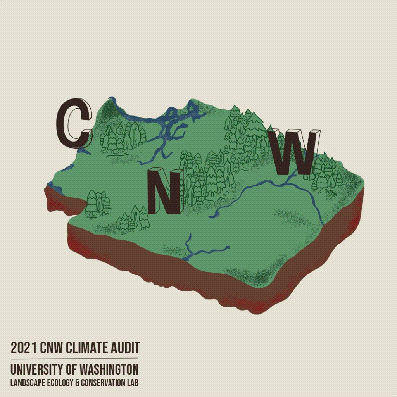University of Washington researchers conduct a climate audit for Conservation Northwest
Conservation Northwest / Jan 21, 2022 / Climate Change
Results will help guide future planning and program development to build a more climate-resilient future.
Conservation Northwest’s mission to protect, connect and restore wildlands and wildlife is highly impactful to climate issues. As we navigate the precipice of a rapidly changing climate, sound science and on-the-ground solutions are more critical than ever.
We tasked researchers at the University of Washington’s Landscape Ecology & Conservation Lab to audit our core programs and the degree to which they address climate change.

Researchers surveyed and interviewed our staff through a qualitative study to determine “how the programs address climate vulnerabilities, what science is being used to address climate change, [and if] projects are designed to reduce greenhouse-gas concentrations.” The six programs audited were the Central Cascades Watershed Restoration, Forest Field, Cascade to Rockies, Sageland Heritage, Coast to Cascades Grizzly Bear Initiative, and the Cascades to Olympics program.
In general, all programs fulfilled the audit’s criteria in effectively addressing climate change.
The UW researchers concluded that “all programs take a landscape-resilience approach to climate adaptation [by] connecting large, intact landscapes, and managing for their resilience.” Specifically in the face of fire and drought. These adaptation strategies consider a wide range of conservation targets and expected climate impacts. In addition, the researchers noted how partnerships with rural and tribal communities strengthen principles of environmental equity.
All six programs (1) increase the amount and connectivity of natural habitat, (2) focus on specific climatic vulnerabilities of target species and systems, (3) reduce atmospheric carbon dioxide concentrations via protection and restoration of natural systems. Researchers recommended a few refinements to improve our work on climate resilience.
This external audit represents our commitment to continue incorporating climate impacts into our organizational strategy.
Our longstanding work across the region demonstrates the innovative ways we garner resilience and sustainability. As we look forward to another season, what climate priorities do you hold regarding our work? Let us know what you think.
DEEP DIVE into THE 2021 UNIVERSITY OF WASHINGTON CLIMATE AUDIT
FOR MORE INFORMATION.


